Site speed optimization services are crucial for enhancing hospitality revenue by significantly improving user experience, reducing bounce rates, and increasing conversion rates. Consider this: even minor enhancements in site loading times can yield substantial financial returns. Faster websites not only encourage more bookings but also foster customer retention, ultimately positioning businesses for long-term success in a competitive market. Therefore, investing in site speed is not just an improvement; it is a strategic move to secure a thriving future.
In the competitive realm of hospitality, the speed of a website can be the defining factor between a potential guest choosing to book or abandoning the site altogether. Research reveals that even a fraction of a second in loading time can significantly impact conversion rates. Studies show that a mere 0.1-second improvement can lead to a staggering 10.1% increase in bookings. This article delves into the transformative power of site speed optimization services, exploring how they not only enhance user experience but also drive revenue growth for hotels and restaurants. However, as the industry evolves and user expectations rise, how can hospitality businesses ensure they stay ahead in the race for online efficiency?
Site performance optimization is crucial for hospitality businesses seeking to enhance their online effectiveness. A fast-loading website significantly elevates user experience, directly impacting conversion rates and customer satisfaction. Research indicates that even a modest 0.1-second improvement in mobile page efficiency can boost conversion rates by up to 10.1% for travel platforms, underscoring the financial implications of performance. Furthermore, 53% of visitors abandon a mobile site if it takes more than three seconds to load, highlighting the urgent need for hotels and restaurants to prioritize speed.
By leveraging a site speed optimization service for website performance, lodging establishments can provide potential visitors with a seamless browsing experience, ultimately leading to increased reservations and revenue. For example, a case study revealed that the adoption of effective site speed strategies resulted in a notable increase in conversion rates for a hotel, illustrating the concrete benefits of such enhancements.
Looking ahead to 2025, the average response time for hospitality websites is projected to be under three seconds, aligning with user expectations. With 58% of mobile users in the U.S. anticipating , ensuring your website adheres to these benchmarks is vital for maintaining a competitive edge in the market. Lights On specializes in delivering tailored solutions that illuminate the path to improved performance, ensuring your business stands out in a saturated landscape. Committed to enhancing digital presence, Lights On empowers hospitality businesses to thrive through effective site speed optimization service.

Quicker access times are crucial for an enhanced user experience, a fundamental aspect of retaining guests. Research shows that users are significantly more likely to . By implementing a site speed optimization service, hospitality companies can capture and sustain the interest of potential guests, thereby reducing bounce rates and increasing the likelihood of return visits. Implementing effective performance enhancement strategies, such as a site speed optimization service, not only fosters a more enjoyable browsing experience but also contributes to elevated guest retention rates.
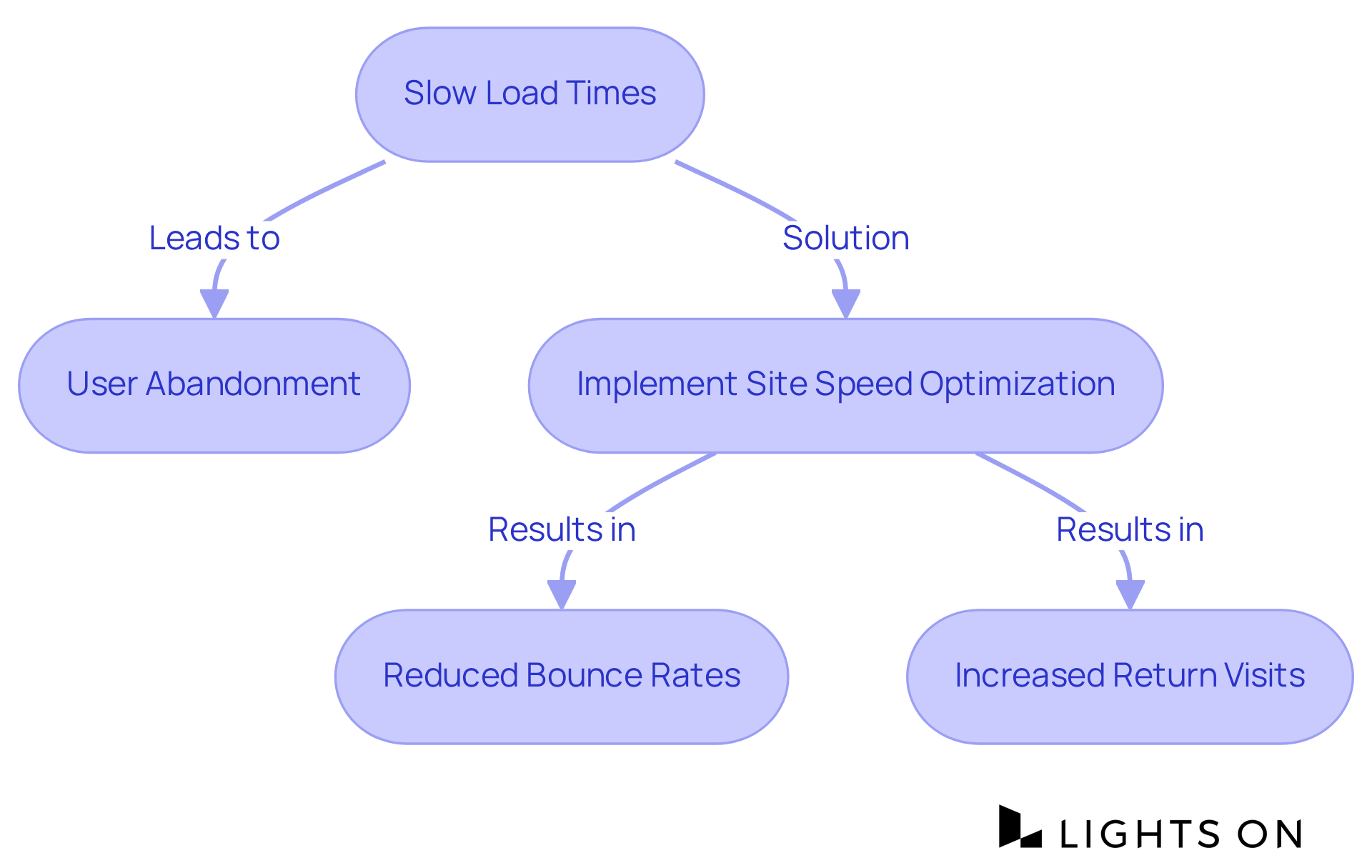
Utilizing a is crucial for enhancing site performance and boosting SEO rankings, as search engines like Google favor fast-loading websites. A swift loading time, provided by a site speed optimization service, not only enhances user experience but also significantly increases visibility in search results. For hospitality businesses, this translates to attracting more organic traffic, thereby increasing the likelihood of converting visitors into bookings.
Data indicate that a one-second pause in page retrieval time can lead to an 11% reduction in page views, underscoring the significance of speed. Furthermore, KissMetrics states that:
Moreover, 70% of consumers indicate that page performance affects their buying decisions, making it an essential element for boosting revenue. Consistently assessing and enhancing webpage performance with a site speed optimization service is vital for maintaining a competitive advantage in search engine rankings, ensuring that hotels and restaurants can effectively attract potential visitors and optimize their occupancy levels.
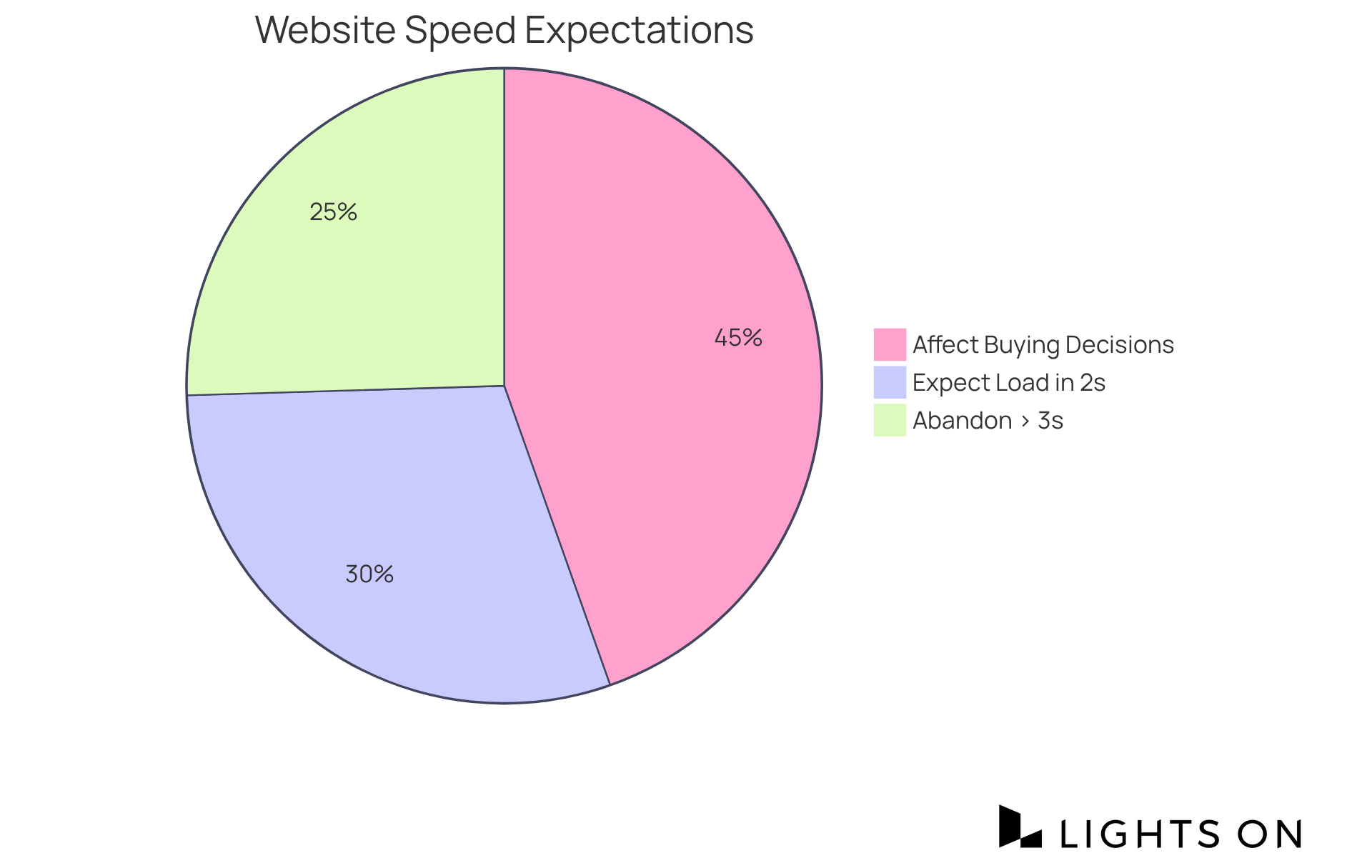
A slow website significantly increases bounce rates, causing potential visitors to abandon your platform before engaging with your offerings. In the service industry, where first impressions are crucial, improving webpage performance is vital for creating a welcoming online environment that encourages guests to explore further. Research shows that for every second delay in page load—especially on mobile devices—conversions can drop by as much as 20%, highlighting the necessity of fast loading times. By enhancing website performance, hospitality businesses not only improve user experience but also elevate conversion rates, making it essential for maximizing revenue. Expert insights reveal that even a slight improvement in loading time can lead to considerable increases in guest engagement and retention.
For instance, studies indicate that a website loading in one second can achieve an e-commerce conversion rate 2.5 times higher than one that takes five seconds. Furthermore, Olivia MacCunn notes that a five-second retrieval time increases the likelihood of bounce by 90% compared to a page that loads in one second.
To effectively lower bounce rates and keep potential guests engaged, it is crucial to implement a site speed optimization service that includes strategies such as:
These actions ultimately drive higher revenue for hotels and restaurants.

Speed optimization is crucial for enhancing conversion rates within the hospitality sector. Research indicates that even a can lead to a 7% decrease in conversions, highlighting the significance of a fast-loading website. By optimizing your site for performance, you simplify the booking process, facilitating an easier experience for potential guests to finalize their reservations. For example, hotels that have executed targeted 'Book Direct' campaigns have witnessed direct bookings surge by 15-20%, illustrating the advantages of a seamless online experience.
Furthermore, data reveals that online companies collectively suffered a loss of nearly $2.6 billion in revenue due to slow loading times. In the hospitality industry, where 65% of same-day hotel bookings are made via mobile devices, ensuring swift response times is imperative. A one-second delay in mobile loading can impact conversion rates by as much as 20%, underscoring the urgency for hotels to prioritize efficiency optimization.
Implementing effective techniques as part of a site speed optimization service—such as:
not only enhances user experience but also translates into tangible increases in bookings and overall revenue. By focusing on minimizing wait times, hotels can significantly improve their online performance and secure more direct reservations, ultimately leading to greater financial success.
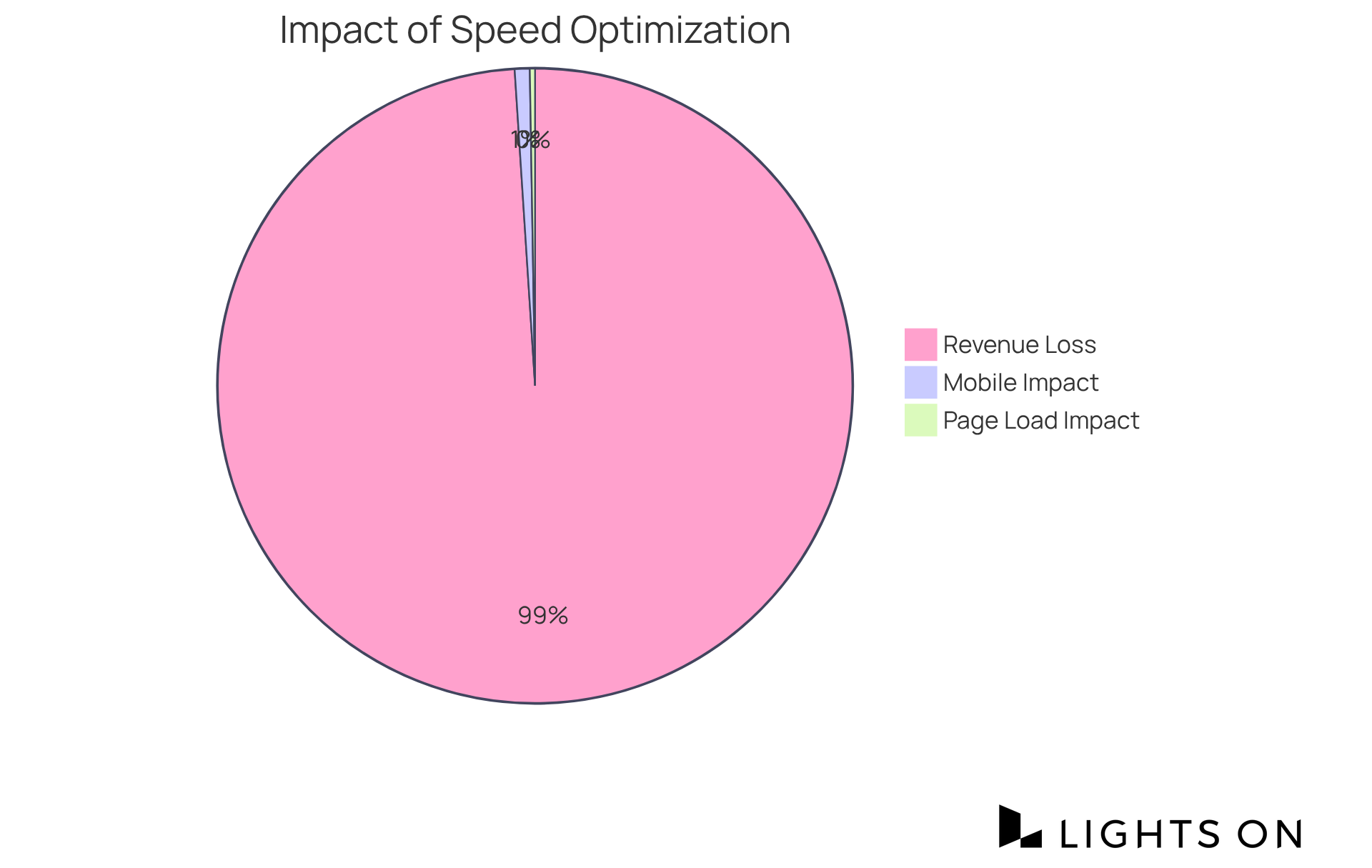
In the fiercely competitive hospitality landscape, utilizing a site speed optimization service makes a fast-loading website essential for success rather than just an advantage. Studies show that 45% of users abandon a website that takes more than three seconds to load, underscoring the critical importance of speed in retaining prospective visitors. A fast-loading webpage significantly influences visitor preferences, as travelers are more inclined to book with hotels or restaurants that deliver seamless online experiences. By prioritizing webpage performance, hospitality companies can enhance their online presence and attract a larger audience, ultimately boosting market share and profitability.
Moreover, fast websites are proven to improve conversion rates; research indicates that even a one-second delay in load time can result in a 7% decrease in conversions. To enhance website performance, consider using a site speed optimization service that implements strategies such as:
As the sector evolves, investing in a site speed optimization service emerges as a strategic decision that can yield substantial benefits, positioning companies ahead of their competitors.
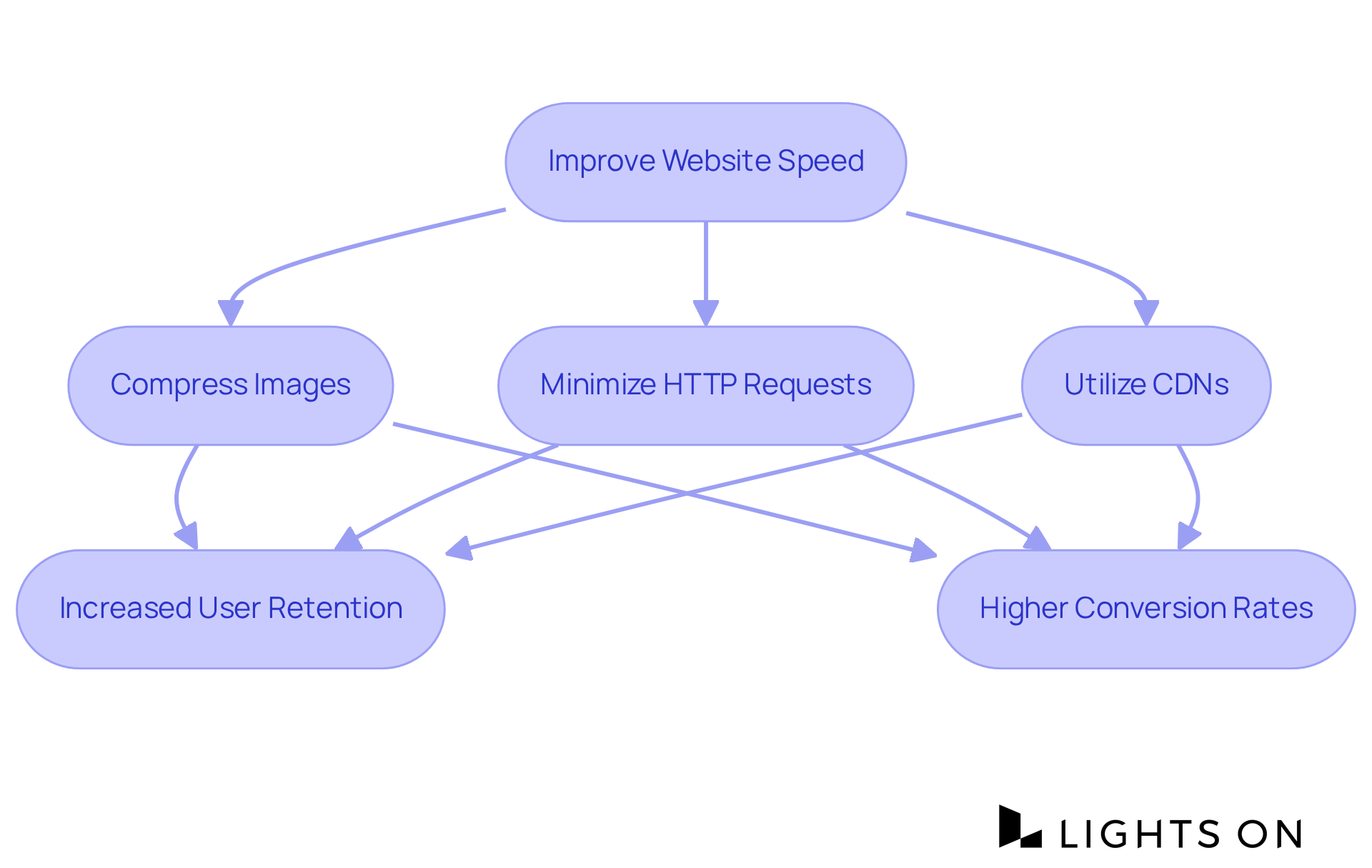
With the rise of mobile bookings, a for your website has become essential—not optional. A swift mobile experience directly influences user satisfaction and conversion rates. Studies reveal that 53% of mobile users abandon websites that take longer than three seconds to load, underscoring the urgency for hotels to enhance their mobile efficiency.
By reducing page refresh times—ideally to under two seconds—hotels can significantly increase direct bookings and elevate overall guest experiences. Implementing strategies such as:
can be part of a site speed optimization service to achieve faster load times and a smoother booking process. In fact, hotels prioritizing mobile performance experience a 25% increase in conversion rates, demonstrating that a fast mobile site not only captures more bookings but also fosters customer loyalty. As the service industry evolves, ensuring a seamless mobile experience is crucial for maintaining competitiveness and maximizing revenue.

Boost Revenue: Leverage Site Speed for Higher Sales in Hospitality
Site speed optimization emerges as a pivotal lever for enhancing revenue in the hospitality sector. Research indicates that faster websites can significantly boost conversion rates, with studies revealing that even a one-second delay in loading time can result in a 7% reduction in conversions. This factor is particularly critical in the service sector, where user experience directly influences booking choices. Enhanced webpage performance not only reduces bounce rates but also elevates overall user satisfaction, leading to greater engagement and return visits.
To effectively leverage site speed, hospitality businesses should consider implementing the following strategies:
As buyers increasingly anticipate smooth online interactions, service-oriented companies that prioritize webpage performance can secure a competitive advantage. For instance, a well-optimized website can lead to a 50% increase in sales, as users are more likely to complete bookings when they encounter fast-loading pages. Moreover, with mobile traffic accounting for more than 60% of all website visits, ensuring that mobile platforms are optimized for performance is essential for engaging this audience.
Current trends illustrate a direct correlation between website performance and sales growth in the hospitality sector. Companies that invest in a site speed optimization service not only improve their user experience but also position themselves for sustainable revenue growth. By utilizing website performance as a strategic advantage, hotels and restaurants can optimize their revenue potential and thrive in a competitive market.

To ensure sustained success, service-oriented enterprises must commit to the of their performance. Regular assessments and improvements of website performance are essential for adapting to the ever-evolving user expectations and technological advancements, and utilizing a site speed optimization service can play a crucial role in this process. By consistently maintaining high performance, businesses can preserve their competitive edge, ultimately driving bookings and revenue over time.

Expert analysis is indispensable for crafting tailored performance enhancement strategies that meet the unique needs of your hospitality business. By collaborating with industry professionals who grasp the complexities of the sector, you can deploy effective solutions, including a site speed optimization service, that elevate site performance and yield tangible results.
Customized strategies guarantee that your optimization efforts resonate with your business objectives, resulting in enhanced guest experiences and increased revenue. Current trends reveal that a one-size-fits-all approach is inadequate; rather, personalized optimization initiatives are vital for maximizing the effectiveness of your digital presence.
For example, industry experts highlight that into a site speed optimization service can markedly improve operational efficiency and guest satisfaction. By concentrating on distinct business requirements, hotels and restaurants can ensure their optimization strategies remain both pertinent and effective, ultimately driving superior outcomes.
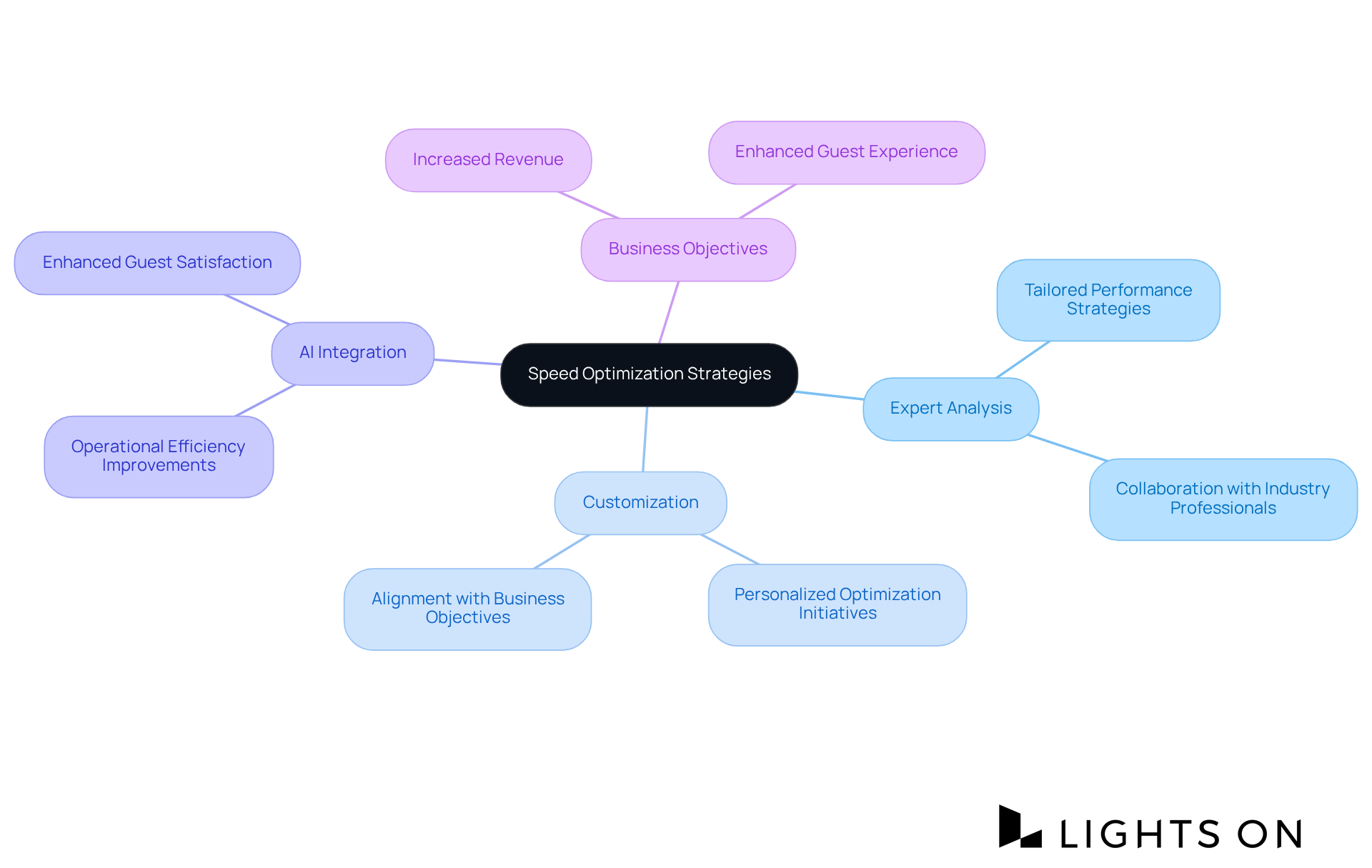
Enhancing site speed is not merely a technical upgrade; it is a strategic imperative for hospitality businesses aiming to thrive in a competitive landscape. A fast-loading website plays a crucial role in improving user experience, increasing conversion rates, and ultimately driving revenue growth. The data presented highlights the significant impact that even minor improvements in loading times can have on customer behavior, emphasizing the necessity for hospitality establishments to prioritize speed optimization.
Furthermore, the article outlines several key benefits of site speed optimization, including:
By implementing effective strategies such as image optimization, minimizing HTTP requests, and leveraging content delivery networks, hospitality businesses can create a seamless online experience that not only attracts potential guests but also encourages them to complete bookings. As the expectations of consumers continue to evolve, maintaining an efficient and fast-loading website becomes essential for capturing and retaining market share.
In conclusion, the importance of site speed optimization in the hospitality sector cannot be overstated. Investing in these services is not just about keeping up with trends; it is about securing a competitive edge and ensuring long-term success. Hospitality businesses should prioritize continuous optimization efforts, leveraging expert analysis to tailor strategies that meet their unique needs. By doing so, they can enhance guest experiences, boost revenue, and ultimately thrive in an increasingly digital world.
Why is site speed optimization important for hospitality businesses?
Site speed optimization is crucial for hospitality businesses as it enhances user experience, directly impacting conversion rates and customer satisfaction. A fast-loading website can significantly increase reservations and revenue.
What impact does a slow-loading website have on visitor behavior?
Research indicates that 53% of visitors abandon a mobile site if it takes more than three seconds to load. Additionally, users are more likely to leave a platform that takes longer than three seconds to load, which can lead to reduced guest retention.
How does site speed affect conversion rates for travel platforms?
A modest 0.1-second improvement in mobile page efficiency can boost conversion rates by up to 10.1% for travel platforms, highlighting the financial implications of performance enhancements.
What are the projected expectations for website response times by 2025?
By 2025, the average response time for hospitality websites is projected to be under three seconds, aligning with user expectations, as 58% of mobile users in the U.S. anticipate rapid load times.
How does site speed optimization contribute to SEO rankings?
Fast-loading websites are favored by search engines like Google, which boosts SEO rankings. This leads to increased visibility in search results, attracting more organic traffic and improving the likelihood of converting visitors into bookings.
What are the consequences of delays in page loading times?
A one-second pause in page retrieval time can lead to an 11% reduction in page views. Additionally, 47% of consumers expect a website to load in 2 seconds or less, and 40% would abandon a site that takes more than 3 seconds to load.
How can hospitality businesses benefit from a site speed optimization service?
A site speed optimization service can foster a more enjoyable browsing experience, reduce bounce rates, increase guest retention, and ultimately enhance revenue by improving site performance and loading times.
Transform your group booking strategies with Lights On and watch your occupancy soar.